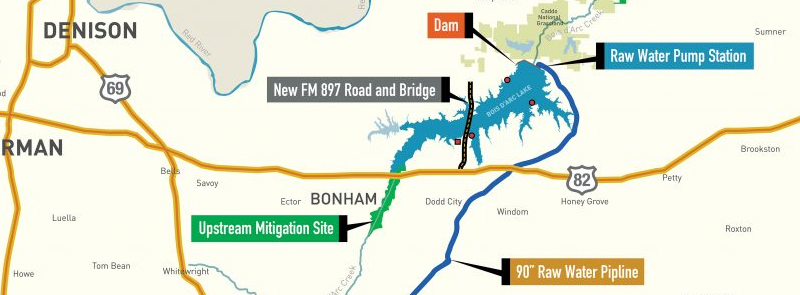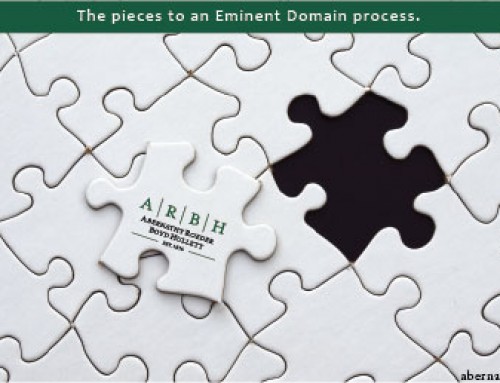illustration credit https://boisdarclake.org/
Overview of Bois d’Arc Lake Project
The North Texas Municipal Water District is building Bois d’Arc Lake, a 16,641 acre reservoir located NE of Bonham in Fannin County. The Water District will use water from Bois d’Arc Lake to supply water to the DFW Metroplex. In order to deliver treated water to the DFW Metroplex, the Water District is taking water line easements from the Dam of Bois d’Arc Lake to a treatment facility in Leonard as well as additional water line easements from Leonard to Wylie. The 90 inch raw water line from the dam, north of Honey Grove, to the treatment facility in Wylie is approximately 35 miles in length. The 84 inch treated water line from Leonard to Wylie is approximately 25 miles in length. But how does the Water District obtain the land rights needed for the water lines and related infrastructure?
Here are 5 things you need to know about Eminent Domain.
-
The Take
Eminent domain is the power to take private property for public use, following payment of just compensation to the owner of that property. Numerous things must happen before it gets to this level. The Texas Property Code mandates that the Water District take several actions prior to initiating a condemnation.
-
The Offer
An initial offer must be made by the Water District. This offer must include a dollar amount, the Landowner’s Bill of Rights, and the proposed easement. After making the initial offer, the Water District must wait 30 days from until it can send a final offer. The final offer must include, in addition to the documents sent with the initial offer letter, an appraisal of the property. The Water District cannot take any further action until 14 days after the final offer letter.
-
The Condemnation Petition
If the land owner and the Water District do not agree through the offer phase, then the Water District will file a condemnation petition. Once the condemnation petition is on file, the presiding Judge will appoint special commissioners to conduct a hearing to determine the value of the taking.
-
The Hearing
Three special commissioners will set a time for a hearing for the parties to present testimony and evidence for the special commissioners to consider and make an award. Typically, The Water District will appear at the hearing with its lawyer, engineer, and appraiser. The Water District will put on testimony about why it is taking the property and the value it has assigned to the property taken. The landowner can cross-examine the Water District’s witnesses. The landowner can then put on its own testimony and the Water District can cross-examine the landowner’s witnesses. The special commissioners then deliberate and enter an award for the value of the property taken and any damage to the remaining property.
-
The Award
The Water District will file the award. Both sides have about 30 days to object to the special commissioners’ award if unhappy with the decision. The Water District typically deposits the amount awarded in to the Court’s registry during this time period. The deposit of the funds in to the Court’s registry sets the date for the taking. This also authorizes the Water District to take possession of the property. If neither side objects, then the Court will enter a final judgment transferring ownership of the property to the Water District and awarding the landowner the money in the Court’s registry. If any party objects, then the issue of value will be litigated to a jury as with any other civil trial.
This article should not be construed as legal advice related to any specific facts or circumstances. This article is intended to educate readers. It is not to provide advice that will be the basis for action or inaction in any specific circumstance. Viewing these materials does not create an attorney-client relationship between ARBH and the reader or the reader’s institution. For circumstance-specific legal advice, please directly contact a licensed attorney.




Leave A Comment